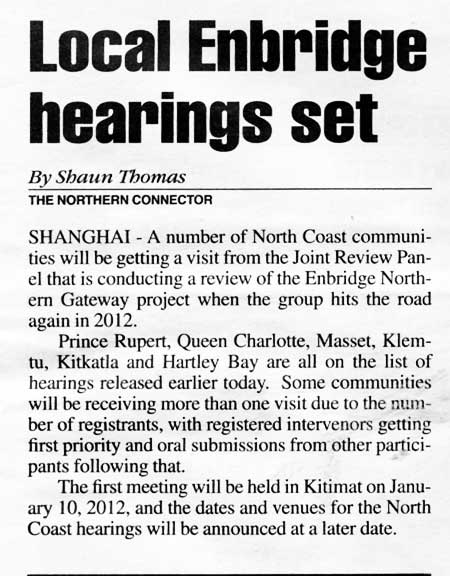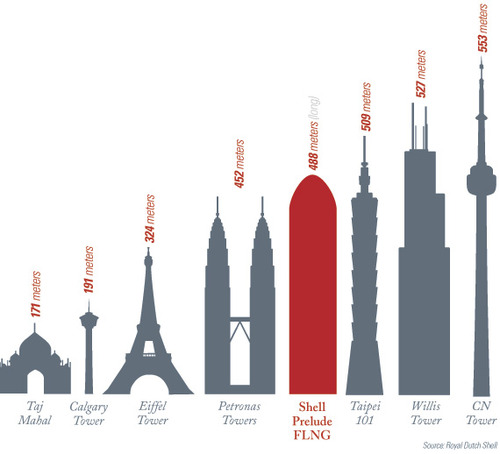This story presents the unfiltered voices of Haisla chiefs when they testified at the Northern Gateway Pipeline Joint Review hearings on January 10, 2011, at Kitamaat Village, based on the official transcript. There have been minor edits for clarity.

My name is Rod Bolton. I was born here in Kitamaat Village in 1940. My late father’s name was also “Rod Bolton”. My Chief’s name is “Ligeiff” and also was a spokesperson for the late Tony Robinson and also Sammy Robinson now as one of the chiefs of the Beaver Clan.
I can remember as a very young child with my late cousins, Chris Wilson, Yvan Woods, going over the boat on the other side where there was no industries. There was just a beautiful place to go to; to go hunt and to go fish. There’s nothing around us.
I want to show you the area, the bagwaiyas and the wa’wais that I own. It’s a place where we harvest and where we fish for fish and hunt for food. That person up there is my late — John Bolton — that’s the one Sammy was talking about — Chief to see — and right around that area, the Kitimat River, that’s right by Sand Hill – – it’s right by Sand Hill, all the way down. That’s north of — south of Sand Hill, all the way down to Peace Creek — north of Peace Creek. That’s my wa’wais. That’s my trap line, registered under the government.
On June 7th, 1993, I was able to get the name of my late dad passed on, and the chief that’s sitting beside me was the one who put that name on le gare . Like I remember that time where — it was quite an experience for me. I was on the council for the period of probably 14 years or more, though it could be less, and one of the reasons why I didn’t run again was because of health reasons, I wasn’t very well at that time.
While I was in the council I worked, I worked on the trap lines, there was some trap lines that wasn’t registered and I worked on it until we got — we got them trap lines was registered. So I know the areas, I know the names of the area. The area that I have is called the Axta ; Anderson Creek, that’s where my trap line is.
The reason why I brought this up is the pipeline, if it was to be put in place it would run over all the streams that my trap line is on. I’m not an expert at oil but I watch the news of what’s going on. So that’s what I fear, if they ever get that pipeline in there it will do damage to our environment.
Eurocan just packed up and left, what they have that’s a pulp and paper, woods damaged our river, now they talk about this. That is a big concern of mine.
I don’t mind oil, not the oil we talk about but the eulachon oil. That’s what they want, eulachon oil.
I was on the Treaty team pretty near all my time with the council and I knew some of the areas that they were working on. Environmental departments got a lot to do with it, you know, we got the provincial government, we got the federal government.
As we speak, we don’t have any representatives here from the federal government. They are back east, they’re in Ottawa area. If they have environmental department then we haven’t seen them; they haven’t approached us.
We don’t want surprises; it happened in the past. When they issued out permits in our area we weren’t involved. We are the stewards of our land, we look after the land. If it’s gone it’s not going to come back again. We seen it in places like Alaska, Mexico, Russia, like what our Chief here said, we’re not — we’re peaceful people, we like to deal with it, to deal with our concerns.
I worked in Alcan for 32 years and I retired in 1998, it doesn’t mean that I stopped fishing, I still go out. Every chance that I get I like going out and bringing my grandchildren along with me and try and teach them.
One of my experiences, when my late father was — was going out with him getting trees; I can remember the cedar shakes that we made to make a smokehouse. So we still use that, we use that to our benefit to our people.
I think one of the things that we look at of where we get our information or wisdom or knowledge is how they trained us because we didn’t have anything and that’s experience and that’s what it brings to the table and that’s what we try to pass on to the younger ones, so they’ll be able to survive in this land, in this day of age.
We used to go to my wa’wais every chance we get, my dad and I, and there’s still fish that goes up there, there’s still some coho and there’s still some kinks that goes up there, trouts.
One of the comments — one of the — our people said was on the lower Axta area it was very important progress for people, everyone used to go there and get their coho for smoking. Every time there was a flood in the river the cohos would get washed down and they go up them small streams and our people knew that, so we were prepared for that.
When I got my wa’wais, my name, it was passed on to me by my late father from his mother and from his father; so that’s how it works. That’s how our system works. So when the name goes to a person like Sammy and I, the trap line goes with them, the wa’wais goes with them and there it becomes stewards of the land; that’s how it works.
Like what Sammy said, the oldest sister is the one that inherits the name and if it doesn’t take it then it goes to the next, it goes on like that.
One of the things that I learned from my father — late father was — and late Tommy, that you cannot wear the blanket or sit in his chair until the feast is over and it is done with. And there’s different places for seating in our feast hall; it’s all arranged depending on who hosted.
We’re not allowed to be part of the feast when we’re young; it was very serious business and fear that someone would knock somebody over with the soup or trip somebody. They had to either put up a feast or pay a person for that accident.
My sister, Ann Phillips, she lives in Vancouver Island. She’s the one that we call kikilfle , the woman that goes and supports the man, getting the game and buys all the dry goods. That’s her role and that’s her responsibility. The Haisla word for that is kikilfle or moodis (ph) and the people that was there at that time was there to witness what took on.
One of the things that were learned as I was growing up is the stewardship of east wa’wais. In order for me to go to Sammy’s wa’wais, if we want to harvest anything, we had to go to the person and ask permission. That’s how they could monitor it and be good stewardship and make sure that things are not overfished or people go there and clean it out. So that’s our culture.
We want to get back to the river. We take a look at what was brought up
— what Sammy brought up, the eulachons. They was — I’ve seen that eulachons. I know what Sammy’s talking about. It was plentiful. We still had a system how we harvest the eulachons.
I can relate to my late father speaking to me about the sea, sea to sea. He’d be the first one to drive piles, to harvest the eulachons. Nobody would drive piles, just him. And after he gets eulachons, he’d invite everybody to have that feast. And when they’re ready 24 hours later, they would say “Go; go harvest,” and everybody would go.
We talked about this in our group. That’s part of conservation, to let some escape so they can come back year after year. That’s how we conserve our fish, our clams, our cockles. We were taught that.
I think one of the points in all our areas, all our progress, everything is written down. On the book that we have it’s called Haisla Land, Nuyem Stories. There’s a lot of people who worked on this. We worked on it, and all the names are on the back of it. So we understand and know what it’s all about. It’s education for the younger generation and how it had — how it passes on to names.
I have before me the — the cycle of fish that goes up these streams. We have sprint salmon. We have coho. We got pink salmon. We have deer. We have black bear. We have geese. We have ducks. We have cedar bark, crab apples, marten, beaver and berries. All those we harvest.
That’s what I do in summertime; I go out and prepare for that and my daughter is the one that picks wild crab apples for me. So that’s what we do when we prepare.
One of the things we talked about, as Jennifer was — the trap lines and how I worked on it and when my late father passed away, I was able to get some of his stuff from a box where he kept all his papers and that’s where I found an old trap line registration. And it wasn’t like paper like this. It was like a skin and how thick it was and I showed it to J. Powell. Passing on down names, that’s how far back it
goes.
One of the things that I address is that if we see a spill of oil in our area, it’ll never recover. There’s no way of cleaning it up. I seen it. I got a friend in Alaska who’s going through all this. It still hasn’t recovered. That is our concern here, why we gather here.
And with that, I’d like to thank you for the time. Thank you very much.
 Actually, of course, the NEB remains in Calgary and
Actually, of course, the NEB remains in Calgary and 
 As reported in April by Alberta Oil
As reported in April by Alberta Oil 